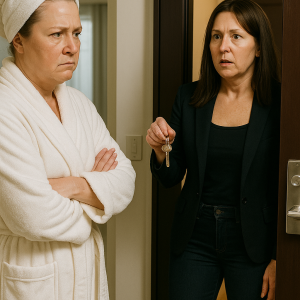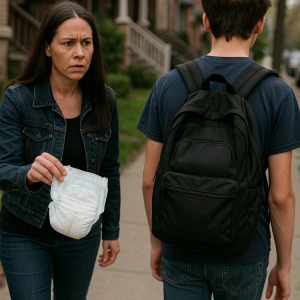My Son Kicked Me Out My Own Home for His Wife, Three Months Later, I Made Them Regret It
“We can’t keep you here anymore. You need to leave.”
My son’s eyes didn’t waver when he said it.
I didn’t argue. Didn’t plead. I just walked away. Quiet. Dignified.
The next day, what I did with my savings left the entire family stunned into silence.
The living room was dim that evening—just how I liked it after sunset. The faint scent of jasmine tea lingered in the air, and the ticking of the wall clock broke the stillness, one patient beat at a time.
I was folding laundry when the words fell.
My only child. My Minh.
“There’s no space for you here anymore. You’ll have to move out.”
No tremor in his voice. No trace of hesitation. He stood there like a landlord evicting a stranger, arms crossed, speaking to the woman who had given up her youth to raise him. The one who had skipped meals so he could eat, patched her shoes until they fell apart so he could go to school with something new.
For a moment, I thought perhaps my ears had failed me. But then I saw his wife, slouched on the sofa, eyes glued to her phone, offering not a single word. My grandson looked up briefly from his game, then sank back into his glowing screen.
I tried to laugh. “Minh… where would I even go?”

His face stayed hard. “We’ve decided. Your room will be our office. You’ve been living here rent-free long enough. There’s a retirement home nearby—you should check it out.”
The words didn’t just sting—they hollowed me out. A retirement home? I didn’t know a soul there. I had been the one cooking their dinners, picking up after their child, keeping their household running… and now, like a worn-out chair, I was being set aside.
That night, I packed. Not because they asked, but because pride is a strange, stubborn thing. My hands trembled as I folded each piece of clothing into the suitcase. I would not cry in front of them. I would not beg.
But I didn’t go to the retirement home.
I took a bus to the edge of the city, where the river runs slow and brown. I found a small guesthouse that smelled faintly of dust and old books. It was quiet. No one asked questions.
That night, I lay in the narrow bed, eyes fixed on the ceiling. My suitcase sat in the corner. And hidden deep in its lining, wrapped in my wedding ao dai, was my secret.
A bankbook.
They didn’t know. Over the years, I had saved—every odd job, every little gift, every red envelope slipped my way. When my husband died, I never touched his insurance payout. Let them believe I had nothing. Let them think I relied on them.
The numbers stared back at me: nearly a million dollars. Not enough to be rich, but enough to change my life.
For sixty years, I had lived for others. That morning, I decided to live for me.
When I was young, I’d dreamed of owning a teahouse by the river. My husband once laughed and said, “Only if you bake.” So I would. And I would make it a place for women like me—women who had been pushed aside, overlooked, forgotten.
Three months later, it stood there on a quiet street: a narrow shop with lavender walls and sunlight spilling across second-hand tables polished to a shine.
I named it Floating Clouds. A place for drifting hearts to rest.
The first week was slow. But soon, word spread. I poured lotus tea into porcelain cups, served sesame cookies with palm sugar, and played old Trịnh Công Sơn records. Outside, a hand-painted sign read:
Free tea for women over 60. You are seen. You are loved.
They came. They told stories of lost husbands, ungrateful children, dreams they had packed away. We laughed. We healed.
One Sunday, the doorbell chimed—and I looked up to see a familiar car outside.
My son walked in, his wife and child trailing behind. They glanced at the busy, warm room, their eyes catching the sign above the door.
“Mom?” Minh said softly. “A friend told me the owner was you.”
“Yes,” I replied. “I started it.”
He frowned. “But how? Where did you get the money?”
“I saved,” I said. “And I remembered who I was.”
He hesitated. “We were thinking… maybe you could come back. We could make room.”
I looked at him steadily, my voice calm and certain.
“No,” I said. “This is my home now.”
That night, under lantern light, I sat on the patio and watched the river glimmer with starlight.
They say revenge is best served cold.
Mine came warm—in porcelain cups, fragrant with jasmine and memory, shared among women who finally knew they mattered.
And it was sweeter than anything I had ever tasted.









